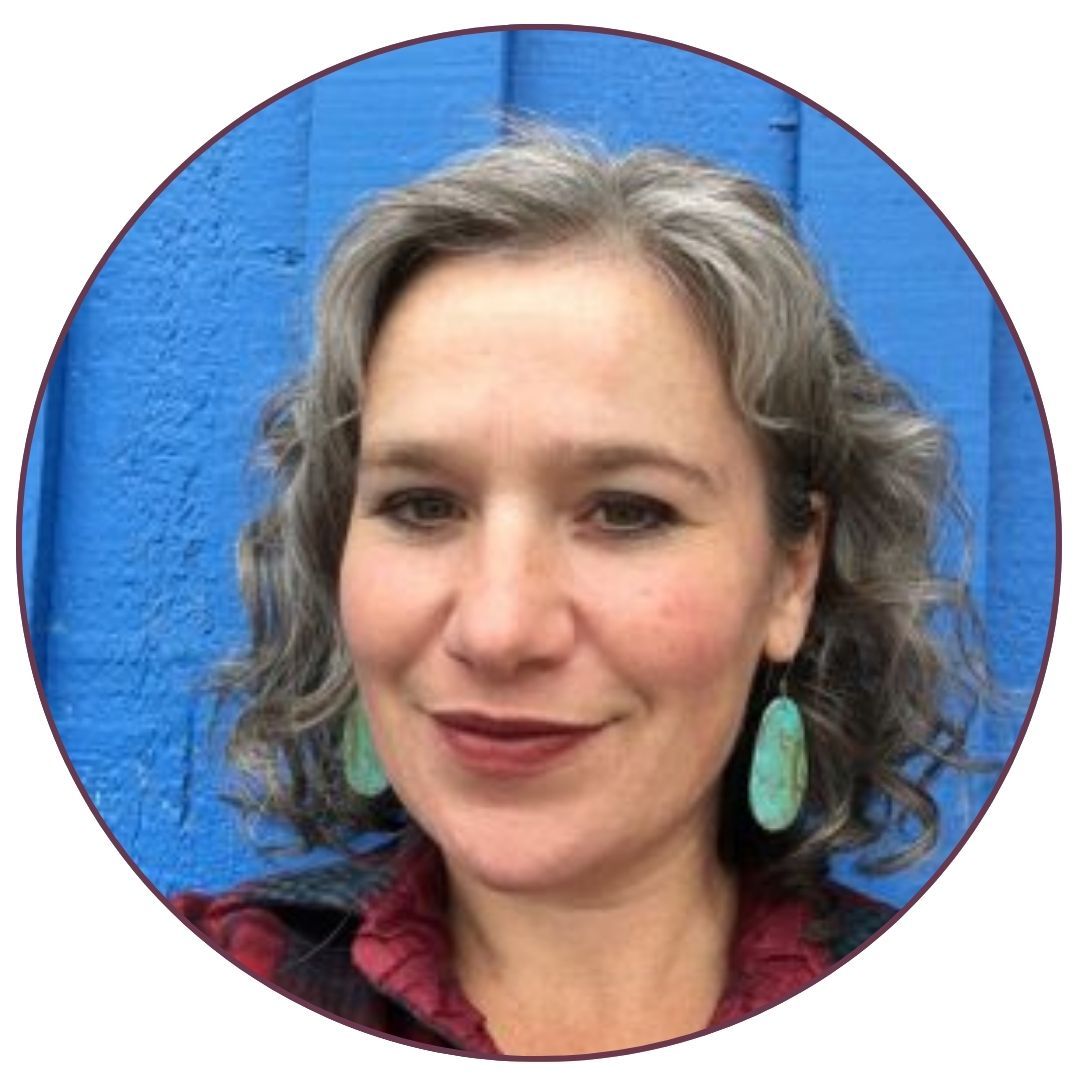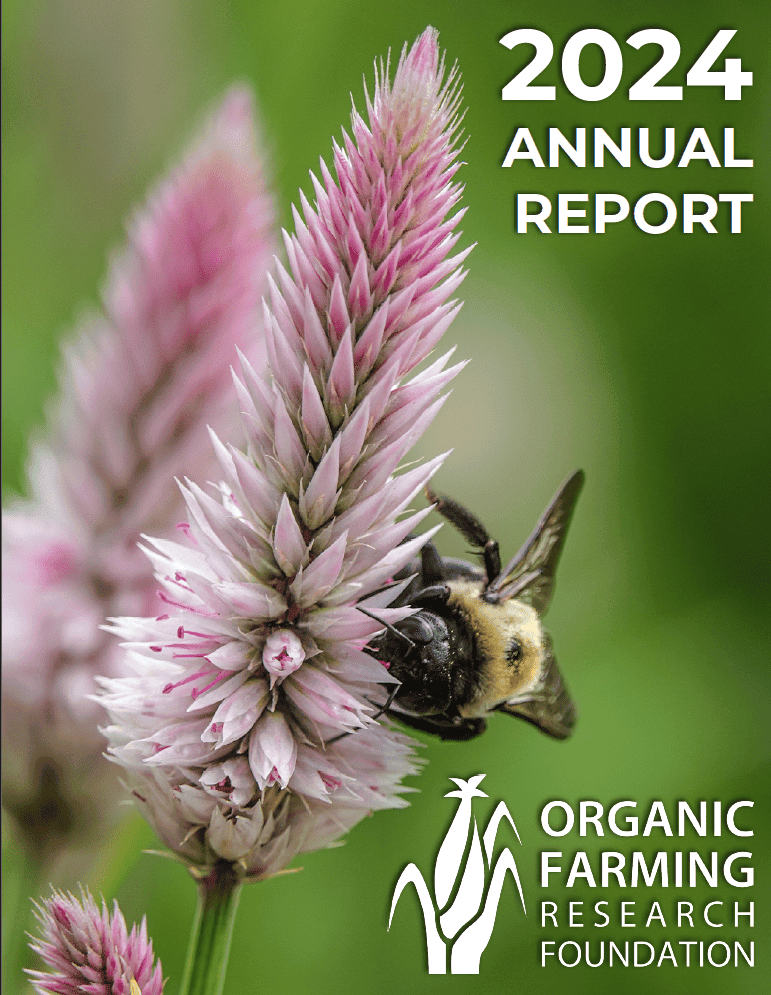We’re celebrating the release of our Annual Report! Featuring three stories from farmers, researchers, and organic advocates, this report highlights the impactful work we’ve accomplished in 2024. This past year, our mission to foster the improvement and widespread adoption of organic farming systems has taken us from farm fields to capitol steps to research labs, and we’ve had the opportunity to work with many passionate people who exemplify the heart of the organic movement. We hope you’ll take a moment to read their stories, see what we’ve built together in 2024, and learn more about what’s to come in 2025.

Innovating No-Till Farming with Occultation Tarping
By Rhianna Simes, M.S.Ed. of Verdant Phoenix Farm & Nursery
At Verdant Phoenix Farm, our mission has always been clear—no-till, organic farming rooted in soil health and long-term resilience. For over a decade, I’ve worked to integrate my understanding of soil health with the need to terminate weeds on my farm. I am striving to grow a regenerative ecosystem on our farm that not only sustains itself but thrives. To do this, we rely upon occultation tarping to manage weeds, protect soil structure, and foster biological activity in the soil.
Then, in 2020, the Almeda Wildfire swept through southern Oregon, altering the landscape around us. While the fire didn’t change our farm’s approach, it was a stark reminder of how critical soil health is in the face of disruption. It reinforced what I’ve always known: a thriving ecosystem isn’t just about growing food—it’s about building resilience from the ground up, even in the face of climate uncertainty.
For over 15 years, I have relied on occultation tarping–a technique that uses tarps (I opt for repurposed vinyl billboards) to smother weeds and enhance biological activity while keeping the soil horizons intact. Unlike tilling, which disrupts soil structure, occultation fosters the conditions for a biologically rich, self-sustaining soil ecosystem. With inspiration from the Soil Food Web and the One Straw Revolution, I saw firsthand that this method worked, but I was eager to research the impacts on soil health and weed termination. It was a dream come true to learn more through a hands-on, in-the-field, research-based trial. This project helped me measure the impact and refine my approach so that I can share it with others as part of our farm’s educational work.
That’s why I applied for OFRF’s Farmer-Led Trials program. With their support, I designed and carried out a research trial to compare the effects of tarping versus tilling on soil health and weed suppression. OFRF’s financial assistance offset project costs, and their technical support was invaluable. They provided guidance on structuring the trial, assistance with data analysis, and the expertise I needed to translate my fieldwork into measurable research that benefits other organic, no-till farmers like me. The OFRF team is great to work with!
This project gave me the confidence I needed to pursue further research, and even leverage additional opportunities—from joining The Soil Inventory Project to securing a Western SARE Farmer/Rancher grant to continue to research and legitimize occultation as a technique for no-till farmers and beyond.
My on-farm trial reaffirmed what I’ve always believed: when farmers have the resources to explore and refine organic practices, new strategies are developed, and this innovation helps the entire movement.

A Win for Organic Research: Dr. Quan Zeng’s Fight Against Fire Blight
By Dr. Quan Zeng, Connecticut Agricultural Experiment Station
When I met with staff from Congresswoman Rosa DeLauro’s office earlier this year, I wasn’t there to discuss politics—it was about a disease threatening apple and pear orchards across the country. Fire blight, a bacterial infection, has already cost U.S. farmers over $100 million annually. Organic growers who lost access to streptomycin and other antibiotics in 2014 due to resistance and ecological impact concerns are in desperate need of alternatives.
At my lab, we’ve been working on a breakthrough: identifying naturally occurring yeasts that trigger plants’ natural defenses, offering organic farmers a sustainable way to fight fire blight. Early trials are promising, but as with all agricultural research, progress depends on reliable funding. The USDA’s Organic Research and Extension Initiative (OREI) made our work possible, but federal research funding is declining, and organic research receives less than 2% of the USDA’s total research budget.
That’s why meeting with Rep. DeLauro’s office was critical, given her seat as a leader in the Appropriations Committee. Without continued investment in organic research, all farmers are left without the tools they need to adapt and thrive. And without OFRF’s advocacy and facilitation, these conversations might not happen. OFRF doesn’t just push for more organic research funding; they aim to connect impacted communities like researchers and farmers directly with policymakers, making sure science informs policy and policy leads to real solutions for farmers.
The impact of agricultural research goes far beyond individual farms. Every $1 dollar invested in public agricultural research generates $20 in public benefits, improving resilience, reducing pesticide use, and shaping climate-smart farming practices. Yet, despite these clear benefits, public funding for agricultural research has dropped over 20% over the past two decades. If we don’t act, we risk falling behind in developing the solutions farmers need to navigate a changing climate.
In March, staff from Rep. DeLauro’s office are planning to visit my lab to see this research in action. It’s a small but important step toward securing stronger investment in organic research at the federal level. Conversations like this, sparked by OFRF’s work, are how we transform research into meaningful change for farmers.

Returning to My Roots: How OFRF Helped Me Grow as a Farmer and Advocate
By Dakota Moore, Moore Family Farms, former OFRF intern
Farming is in my blood. For generations, my family has worked the land at Moore Family Farms in North Carolina. When my father and I began transitioning to organic, we knew we were investing in our farm’s future. However, through my internship at OFRF, I discovered something even bigger—how organic farming is part of a movement, one that connects research, policy, and farmers like me in ways I never imagined.
As an intern, I worked on OFRF’s new Organic Research Hub, a one-of-a-kind platform designed to connect farmers with the latest organic research. Sorting through peer-reviewed studies on soil health, water dynamics, and weed suppression, I realized research isn’t just for scientists—it’s for farmers. These findings provide real solutions to challenges we face every day, but only if they reach the people who need them. That’s where OFRF comes in, making sure critical research doesn’t sit on a shelf but gets into farmers’ hands through on-farm trials, webinars, technical resources, and advocacy.
But OFRF’s work is about more than research grants and policy wins—it’s about making sure farmers like me have the support we need to succeed. One of the highlights of my internship was co-presenting in OFRF’s Seeds of Success webinar, “Adding the O: Farmer Perspectives on Transitioning to Organic.” Sharing our farm’s journey and hearing others navigating the same path reminded me that organic farming isn’t just about production methods—it’s about community. Farmers need other farmers.
As I return full-time to Moore Family Farms as farm manager, I’m bringing back more than just knowledge—I’m bringing connections, confidence, and a deeper understanding of how organic farming fits into the bigger picture of agriculture in the U.S. But organic farming’s future depends on continued investment in research, funding, and policies that support farmers like me. That’s why I’m committed to staying engaged—not just as a farmer, but as an advocate. And I know that, with organizations like OFRF leading the way, we’re planting the seeds for something bigger than any one farm—we’re growing a movement.






